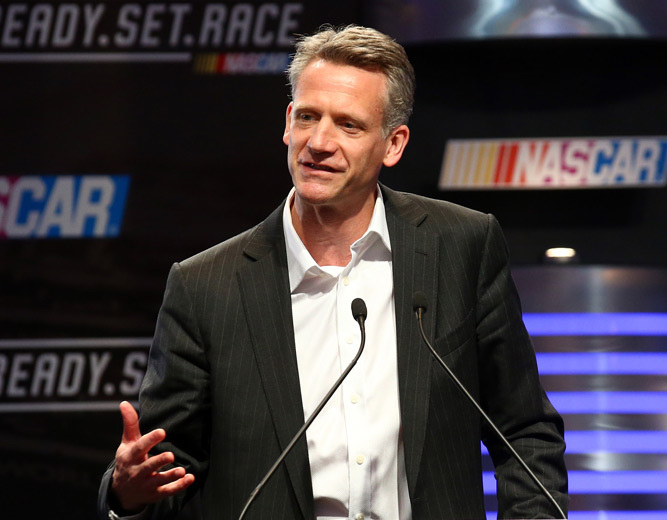Phelps: NASCAR shifting resources
 |
| Steve Phelps |
While NASCAR laid off dozens of employees last month, President Steve Phelps said the move was more about doubling down in key areas, he tells Adam Stern of Sports Business Daily.
Between people laid off and open positions that will not be filled, about 50 to 75 jobs were eliminated that affected employees at offices across the country, according to sources. The jobs represent less than 5 percent of NASCAR’s workforce.
The layoffs included many longtime NASCAR employees on both the competition and business sides. Given the number of people laid off and how long many of them were tenured, NASCAR likely trimmed several million dollars off its bottom line.
But in an interview with Sports Business Journal, Phelps disputed the notion that the layoffs were a belt-tightening maneuver as the sport tries to stabilize. Instead, he said the restructuring is one aspect of a wider rethinking of the sport under Chairman and CEO Jim France.
France is challenging his top lieutenants to spend more time and money on what’s most important to reversing the sport’s fortunes. As part of that, according to Phelps, NASCAR is spending more money in areas it feels are key to putting on exciting races that fill grandstands and get good TV ratings. That also includes investing in new initiatives such as esports and sports gambling, while it reduced headcount in areas less integral to the core aim.
Some departments that saw their headcounts trimmed include NASCAR’s Green and analytics/insight departments, but Phelps said that other employees will now just juggle more duties, as opposed to NASCAR moving away from those initiatives
Phelps’ direct reports have been streamlined down to four. Those are Steve O’Donnell, who oversees competition; Craig Neeb, who oversees technology and consumer innovation and has a dual role at track operator International Speedway Corp., which NASCAR is in the process of acquiring; Daryl Wolfe, who oversees sales and partnerships and also has a dual role at ISC; and Jill Gregory, who has been overseeing marketing and will now add media and communications to those duties.
Gregory added media as part of the departure of Steve Herbst, who served as NASCAR’s SVP of broadcasting and production and helped strike the 10-year media rights deal with Fox Sports and NBC Sports that delivers $820 million to the industry annually. Other notable departures included Norris Scott, vice president of analytics and insights; and Blake Davidson, vice president of consumer innovation.
“It’s not moving away from green or analytics; it’s the integration of groups into other groups that we think work well together and where there’s some synergies," Phelps said. “If there’s savings from that, then we can redirect dollars.
Overall, Phelps says NASCAR’s founding France family is upping its investment in the sport — such as the $1.9 billion bid to acquire ISC.
One area where NASCAR is already revealing it will be spending more money is with paid advertising. NASCAR has traditionally used its own digital/social channels and the house ad inventory from its media rights partners to advertise. But after a pilot program last year where NASCAR says it saw positive results after doing paid advertising in a couple of key markets, the sanctioning body is fully rolling the plan out this year. One person familiar with the plan said NASCAR will spend between $10 million and $20 million on paid advertising this year, a range Phelps would neither confirm nor deny. Phelps said the advertising will be mostly local and will be on channels beyond just those owned by Fox and NBC.
“Like any good company, you take a step back and look at what’s going to grow your business, and we do the same thing," Phelps said. “We did it to understand, ‘What are those areas frankly where we didn’t need people in those boxes or roles, and what roles do we need? What do we need to double down on from a structural standpoint and people standpoint and then frankly from a resource standpoint, and how can we do that? And what are new initiatives that we can look to re-deploy resources — whether people or money — in those areas to help drive the business?’" Adam Stern/Sports Business Daily
